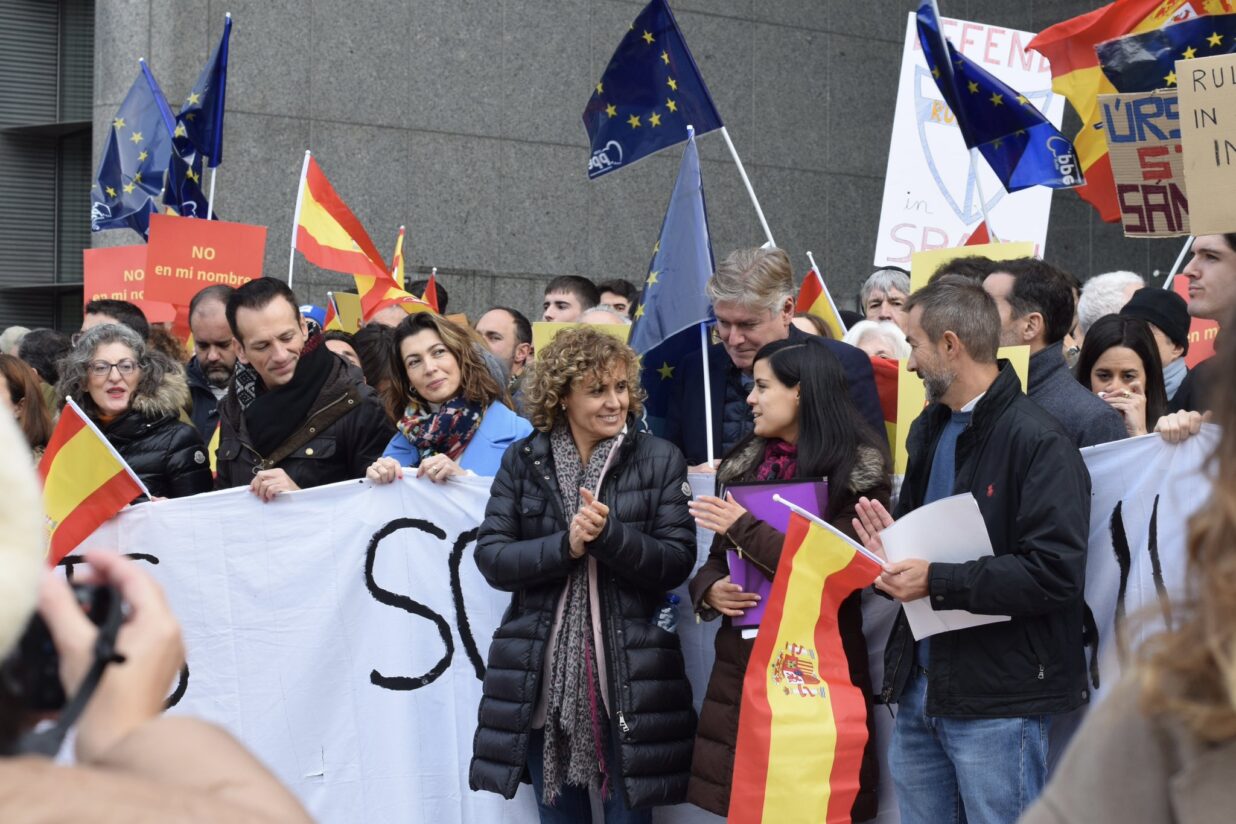23.11.2023 - 00:22
|
Actualització: 23.11.2023 - 10:36
On Sunday the 12th, the European Parliament became the backdrop of a demonstration, led by several Spanish MEP, against the proposed amnesty law for Catalan pro-independence leaders. A few dozen demonstrators attended, led by PP MEP Dolors Montserrat, while Ciutadans MEP Maite Pagazaurtundua also stood in the front row. Among those present were Spanish officials working in the European Parliament. One of them, Jesús Gómez Martínez, stood out in particular, standing in front of the banner and remaining next to Dolors Montserrat at all times. As head of unit of the Directorate for Relations with National Parliaments, Gómez Martínez is not just another official: rather, he holds a prominent position within the management structure of the European Parliament. Since March, moreover, he has also served Secretary General of the PP in Belgium. His participation in a demonstration against the agreement for a law which has the support of the majority of the Spanish congress, however, seems to compromise his duty of political independence, neutrality and discretion — one enshrined in the European Parliament’s code of conduct and in the regulations for its officials.
After the demonstration, Dolors Montserrat posted some photographs on her Twitter account with the following message: “We are demonstrating in Brussels against the PSOE’s amnesty law and their trampling on the rule of law”. In some of these photographs, Gómez –wearing a black jacket, jeans and holding a sheet of paper in his hands– can be seen next to the MEP.
Nos manifestamos en Bruselas contra la amnistía del PSOE y su atropello al Estado de derecho.
We gathered in Brussels to stand against the amnesty law by the Spanish Socialists PSOE and their attack on the separation of powers and the rule of law. #EspañaNoSeRinde pic.twitter.com/tFaLO7uMpq
— Dolors Montserrat (@DolorsMM) November 12, 2023
Gómez Martínez also appears on some of the videos the EFE agency published of the demonstration:
Such images raise the question of whether the public political stances of this high-ranking official are compatible with the Parliament’s code of conduct, particularly given the responsibilities of the office Gómez Martínez now holds. As stated on the website of the European Parliament itself, the directorate which he heads follows the following mission: “To advise the political bodies, Members and the secretariat of the European Parliament in their institutional cooperation and legislative dialogue with the national Parliaments”. The site, moreover, details that the directorate “acts as a knowledge centre for information regarding national Parliaments and provides information to the EP administration on best practices within national Parliaments. It represents the European Parliament in the administrative networks of interparliamentary cooperation”.
In view of its stated mission, VilaWeb contacted the European Parliament to find out whether Gómez’s participation in the demonstration is compatible with the duties of his position. In its response, the press office argued that EU officials enjoy the right to freedom of expression and opinion, adding that “according to article 12 of the EU Staff Regulations [of Officials of European Communities], employees have to refrain from any action or public expression of opinion that may reflect negatively on their position”. It also held that “the Parliament does not object to its officials being politically active, as long as they do so in a strictly personal capacity and therefore outside working hours. If an official speaks in public, he or she has to respect the dignity of his role”. Last but not least, it specified that Parliament officers have the duty to declare whatever external activities they may carry out.
Regarding this issue, VilaWeb asked Gómez Martínez if he had requested the authorization of his superiors to take part in the demonstration, and whether he had consulted them before taking on his role for the PP in Belgium.
Gómez Martínez replied that he is authorized “to carry out external activities consisting of the exercise of the right to freedom of peaceful assembly and freedom of association, including political activities”. This, he added, is due to the fact that such activities are not remunerated and are carried out outside working hours, “including weekends”. Regarding the incompatibility of his position within the European Parliament with the position he holds within the PP in Belgium, Gómez Martínez argued that the Staff Regulations for EU officials, as stated in article 15, refer to “officials who are candidates for public office during electoral processes, such as European, general, regional or municipal elections”. Lastly, he added that the position of president of the PP in Belgium “is not an elected public office for the purposes of the Staff Regulations”.
It is true that article 15 of the Staff Regulations holds what Gómez Martínez argues. Article 12, however, establishes that –without prejudice to the provisions of article 15– “an official wishing to engage in an outside activity, whether paid or unpaid, or to carry out any assignment outside the Communities, shall first obtain the permission of the Appointing Authority”. In fact, the response of the European Parliament’s press office reply to this very question is that “in accordance with article 15, any official carrying out an outside activity, whether paid or unpaid, shall obtain prior authorization from the pertinent authority.” It adds: “Leave shall be refused only where the activity or purpose in question is likely to interfere with the performance of his duties or is incompatible with the interests of the institution.”
This newspaper has been unable to obtain from the European Parliament any information on whether Jesús Gómez, as head of the Directorate for Relations with National Parliaments, had requested any authorization regarding these cases and whether he had received it. In refusing to share this information, the Parliament alludes to the confidentiality of “individual cases”, arguing such matters are “an internal procedure”. Gómez Martínez, for his part, says that he was “authorized” to participate in the demonstration, and argues that he did not need any explicit authorization to accept the position of PP president in Belgium.
Spanish officers from several EU institutions have recently joined the protests organized by the right and the far right against the agreement the between the PSOE and the pro-independence parties to form a government in Spanish. This is the case of a group of European Commission officials who promoted a letter and collected signature to pressure Commissioners Didier Reynders and Vera Jourová against the amnesty law that has been the centrepiece of the negotiations between the pro-independence parties and the PSOE.



